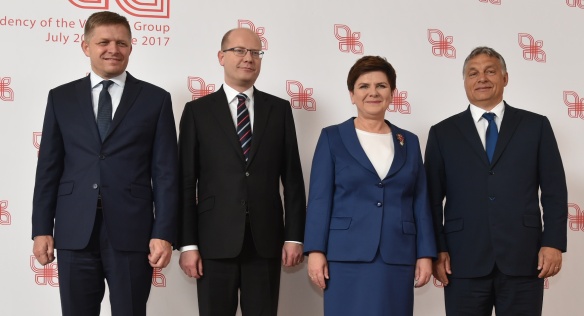
25 Jul A View from Central Europe: What next for EU?
By Edit Inotai
The Polish government has joined the choir of calls for the reform of the EU which became commonplace in the post-Brexit Europe. Warsaw has its own ideas, even if they are ready only in broad strokes so far, and we shouldn’t assume that they are meant to serve only the internal political goals. The moment is opportune for the Law and Justice government to seek the strengthening of the EU’s intergovernmental dimension, thus challenging the supranational path favoured by the Old Continent’s federalists.
Any resemblances to Wolfgang Schäuble’s pragmatic ideas on the future of Europe are, however, purely coincidental. When the German finance minister says that governments may have to solve certain issues, like refugee flows or border security, “if the Commission fails to act”, he is demonstrating his commitment to the ‘getting things done’ paradigm. Instead, the Polish government may be using the refugee question together with the Brexit confusion as pretexts to seek more clout vis-à-vis Brussels and to reinforce its regional leadership. Warsaw may also be pushing forward a Westphalian vision of national sovereignty, seeking to bring back to Member States competences in such areas as justice or security – even if European Treaties make the feasibility of such an operation highly unlikely.
Some details of the Polish ideas on the EU reform may already be discussed among Central European governmentsat the V4 Summit in Warsaw on July 21st. We should also expect issues of migration and border control to dominate the V4+ meeting of interior ministers in autumn, organised among the four Visegrad members plus Romania, Bulgaria and the Baltic States. Yet the region should not be expected to welcome Warsaw’s ideas with enthusiasm. Some countries, like Romania, have reacted to Brexit by seeking more and not less integration, accelerating their efforts to enter the Eurozone. Slovakia and the Baltics are already there. Neither they, nor the Czechs, would like to mess up with Germany. And most of all, no country in the region (even Hungary) seems to enjoy the idea of ending up in the EU’s second-line ‘consolation club’ led by Poland. That is why any attempts to arrive at a common Central European position on the EU reform may reach, at most, a meagre and hackneyed “We care for Europe”. So far, it’s only a storm in a teacup.
“A view from Central Europe” is a series of monthly blog-style publications providing a platform for foreign and EU policy experts, including young and up-coming thinkers, from the Visegrad Group region – Slovakia, the Czech Republic, Hungary and Poland – to reach an EU wide policy-focused audience. The project aims to intensify dialogue between the Visegrad capitals and European opinion-makers on hotly debated issues in the EU agenda with strategic implications for Central Europe. The project is run by the GLOBSEC Policy Institute.
To find the whole article and further opinions from V4 point of view on EU please click here.
This project is supported by the International Visegrad Fund.

